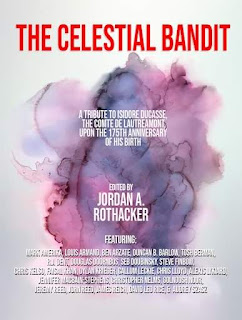A God of Flies Among Them by Philip LoPresti
Jessop Thorn returns to his childhood home to confront his past. His family had mysteriously disappeared one by one, and now he wants closure. As he explores his old home and town, the secrets of his bloodline begin to come out.
This novella is a Southern Gothic with elements of horror and mystery. Like LoPresti's other work, it's heavily atmospheric and character driven. Jessop is stalked by ghosts, both literal and figurative, as he explores his old town. While he does meet some of his old friends, there's a pervasive sense of loneliness and alienation his journey. He wants to make connections with others, but his upbringing leaves him unable to.
LoPresti's prose vividly depicts the eerie and the grotesque circumstances of Jessop's old town. The story ends with little resolution, but in a book like this that's to be expected. For someone like Jessop, there are no resolutions.
I highly recommend this book. It's creepy, heavy, and beautifully written. Pick up LoPresti's other work while you're at it.
Buy A God of Flies Among Them by Philip LoPresti here.
Hello, Old Friend by Elizabeth Bedlam
Eve is a successful writer who suffers from severe anxiety. It's gotten so bad she can barely talk on the phone, go to the grocery store, or even visit with her therapist. One day, a fellow patient introduces her to the self-help program of Dr. Gish. They're a simple set of DVDs with the doctor giving her instructions, but they work wonders for her. However, she soon finds there's a heavy price to the program.
I have a lot of praise for the imagery that Bedlam conjures in this novella. She comes up with some horrible, vivid ways to demonstrate the pain and the breakdown that Eve goes through in the story. Especially with the segments with Dr. Gish. I could hear the voice of the doctor in my head; a deep, calming voice that at the same time is vaguely ominous.
That said, there were things that kept me from liking it as much as I wanted to. The biggest problem is that ending is predictable and, after all the build-up, reads like a shuffling off the stage. There's also a tendency of the prose to suddenly switch the omnipotent 3rd person from on Eve to another character for only a paragraph or so, which feels very awkward and pointless for characters who are only around for that long.
I also felt that the story rushed a bit too much from the program making Eve feel like a healthy, functional person to having her become obsessed and going completely crazy. It would have benefited from being a little longer in the middle.
Despite my problems with the book, I enjoyed it overall and I finished the novella in one sitting. I think this is worth reading and I'll be picking more of Bedlam's works.
Buy Hello, Old Friend by Elizabeth Bedlam here.
Four Circles by Meg McCarville
This book is a memoir by sex worker, model, performance artist, and madwoman Meg McCarville and recounts her life in four cities; Chicago, Oakland, Miami, and New Orleans. She recounts the usually awful people she met, her sexual encounters, her living conditions, and the various diseases (of every stripe) that she comes in contact with.
The book is a mixture of disgusting, hilarious, and emotionally taxing. In the first section, McCarville describes her hatred of anal and oral sex, even having made a zine with a male friend who also hated giving oral sex. This is despite the fact that she's certain neither of them have actually sucked a dick or licked a cunt. This part is immediately followed by a heart-wrenching recounting of a traumatic miscarriage.
The section in Oakland is almost entirely a stream-of-consciousness rant against the people she lived with in the city. In the section in Miami, she confirms that the "Florida Man" memes are true, comparing the poorest parts of the city to World War Z with meth zombies. In her time in New Orleans, she's robbed by vicious crackheads and gets involved in a series of trainwreck relationships, one of which is with a human statue.
It was a little hard to believe the book is less than a hundred pages after finishing it. She packs so much into it and paints such vivid, horrible pictures, you can feel the dirt, grime, and smell the horrible stenches of sex, shit, and rot.
This, as you can probably guess, is not a book for people with weak stomachs. However, it's a damn great work and, if you can handle a constant barrage of disgusting and awful things, I highly recommend it.
Buy Four Circles by Meg McCarville here.













